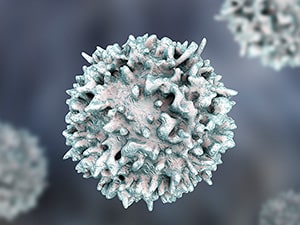The First BTK Inhibitor for Follicular Lymphoma
A new treatment regimen that includes a Bruton’s tyrosine kinase inhibitor was approved for follicular lymphoma.
The U.S. Food and Drug Administration (FDA) has granted accelerated approval to zanubrutinib (Brukinsa) in combination with obinutuzumab (Gazyva) for patients with relapsed or refractory follicular lymphoma who have received at least two prior lines of systemic therapy.
Zanubrutinib is an inhibitor of Bruton’s tyrosine kinase (BTK), which is involved in B-cell activation. In many cases of follicular lymphoma, which arises from malignant B cells, BTK mutations lead to tumor-promoting signaling downstream of the B-cell receptor. Zanubrutinib is the first BTK inhibitor to be approved for follicular lymphoma.

Obinutuzumab is an antibody that binds to CD20, a protein on the surface of B cells that is often found at higher levels on follicular lymphoma cells. Binding of obinutuzumab to CD20 triggers cell death. Obinutuzumab is also approved as part of treatment regimens for the first- and second-line treatment of certain patients with follicular lymphoma.
The approval of zanubrutinib plus obinutuzumab is based on results from ROSEWOOD, an open-label, multicenter, randomized, phase II clinical trial. The trial enrolled 217 adult patients with relapsed or refractory follicular lymphoma who had previously received two or more lines of systemic therapy. Patients were randomly assigned (2:1) to receive either zanubrutinib plus obinutuzumab or obinutuzumab alone.
Sixty-nine percent of patients treated with zanubrutinib plus obinutuzumab experienced treatment responses, in contrast to 46% of patients treated with obinutuzumab alone. After a median follow-up of 19 months, patients who received zanubrutinib plus obinutuzumab had a longer median duration of response (not reached) compared with those who received obinutuzumab alone (14 months).
The recommended dosage for zanubrutinib is 160 mg twice per day or 320 mg once per day until disease progression or unacceptable toxicity. The recommended dosage for obinutuzumab is 1,000 mg for six 28-day cycles (on days 1, 8, and 15 of cycle 1 and on day 1 of cycles 2-6) and then every two months for a maximum of two years in patients with stable disease or a complete or partial response.
The prescribing information for obinutuzumab includes a boxed warning for potentially life-threatening hepatitis B virus reactivation and progressive multifocal leukoencephalopathy.
Follicular lymphoma is a slow-growing type of non-Hodgkin lymphoma. According to federal statistics, it was estimated that follicular lymphoma was diagnosed at a rate of 2.5 cases per 100,00 individuals each year between 2016 and 2020. It was estimated that 0.4 deaths per 100,000 individuals occurred each year between 2017 and 2021.
The FDA rendered its decision on March 7, 2024. Accelerated approval means that continued approval may be contingent upon a confirmatory trial.